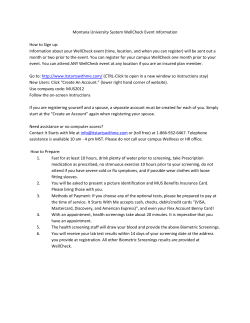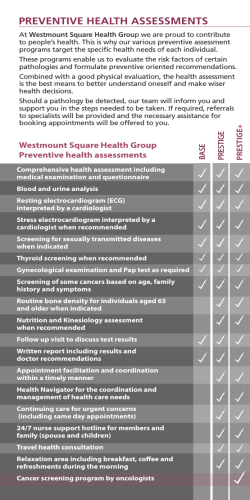
Emerging Considerations in Maternal Mental Health
Joy Burkhard, MBA Founder and Director California Maternal Mental Health Collabora5ve 2020 Mom Project, Campaign Cigna Regulatory Affairs Manager, Lead MMH Team The Federal Affordable Act requires Formed in 2011 at the suggestionCare of the legislature through ACR coverage for preventive treatment 105 (2010), sponsored by the Junior Leagues of Ca. including postpartum depression screening at no cost The of theYet Collaborative to bring stakeholders together to Mission women. given isthe need for additional to exchange ideas and form collaborative relationships to increase research, there are no national standard and improve awareness, diagnosis and treatment of maternal screening guidelines. mental health disorders. TREATMENT OPTIONS Treatment for MD includes psychotherapy or pharmacotherapy or a combination of both. © 2012 CA Maternal Mental Health Collaborative 2 Emerging(Considerations(in(Maternal(Mental(Health( MMH(and(Life(Course(&(Trauma(Informed(Care(( Feb(12=13(2015( Los(Angeles,(California(Endowment’s(Center(for(Healthy(Communities( ( In(partnership(with:( !! ((((((((((((((((((((((((((((((((((((((((((( ! ( ( Did you know? Women in their childbearing years account for the largest group of Americans with Depression. Postpartum depression is the most common complica5on of childbirth. There are more new cases of mothers suffering from Maternal Depression each year as women diagnosed with breast cancer. American Academy of Pediatrics has noted that Maternal Depression is the most under diagnosed obstetric complica5on in America. Despite the Prevalence Maternal Depression goes largely undiagnosed and untreated. • References preventive treatment The Federal Affordable Care Act requires coverage for including postpartum depression screening at no cost to women. YetNIHCM given Fthe need for additional ounda5on Issue Brief Iden5fying and Trea5ng Maternal Depression: Strategies & Considera5ons for Health Plans L.A.’s Best Babies Network there are no national standard screening guidelines. TREATMENT OPTIONS Screening for Postpartum Depression at Well Treatment for MD includes psychotherapy or pharmacotherapy or a combination of both. Child Visits 5 USPSTF & Associations American Academy of Pediatrics recommends screening (2010). “How are you feeling?” ACOG notes insufficient evidence to recommend universal screening (2010, 2012). The USPSTF recommends screening adults for depression in clinical prac8ces that have systems in place to assure accurate diagnosis, effec8ve treatment, and follow-‐ up. Excluded pregnant women. Screening to Tx 5-‐6% of commercially insured women were screened by OB. Less than ¼ of all women receive Tx Untreated Women Only 6% sustain treatment Cigna Study of PPO Pa5ents in CA Carter et al. Aust New Zeal J of Psych 2009; 31 (2): 155-‐62. Smith et al. Gen Hosp Psych 2009; 31(2): 155-‐62. Marcus J Women Health 2003; 12 ($): 373-‐80. What’s Going on? OBGYN Barriers 44% of OBGYNs report they always or oken screen, but may not use a validated tool. 2013 Cigna Medical Record Review found 5-‐6% screen Those who don’t screen indicate: • Don’t feel qualified • Not enough >me to screen/manage • Don’t know where to refer* • No financial incen5ve** Pediatricians raise similar and that mom isn’t their pa8ent. *Shortage of psychiatrists and trained MMH therapists, MH carve out and coverage **Aetna study: paying for PCP depression screening outside of standard office visit rate didn’t increase screening rates. What’s Going on? Family Barriers Women & Families may not speak up, Here’s why: • Confused as to what’s happening • General S5gma of Mental Health • Don’t want to appear ungrateful • Fear that baby will be taken away • Don’t understand risks to baby’s health When moms do speak up, oken help isn’t available. Affordable Care Act The Affordable Care Act Requires health plans and insurers to cover screening for postpartum depression at no cost to the pa8ent. However most HMO plans already cover maternity office visits at $0 co-‐pay. Insurance plan coinsurance was modified. However there is no requirement to pay for screening separate from the standard office visit. Treatment isn’t free. No pre-‐exis8ng condi8on limita8ons for new coverage or declines for Individual Coverage. The US Melanie Blocker Stokes Act Suggests the NIMH consider addi8onal research and that HHS provide addi8onal grants when funding is available. Efforts gone Wrong… • Many assume it’s just a maoer of screening, & work to mandate screening. • Many assume it’s as simple as raising awareness. • NJ was the first to ini5ate legisla5on. • “Speak Up When you are Down” campaign • Medicaid screening requirement hops://www.jlla.org/?nd=su_resources Study illustrated no improved outcomes hop://www.ncbi.nlm.nih.gov/pubmed/21289351 Considerations • Doctors can’t do this alone • All women deserve to be screened • Treatment pathways must be iden5fied before screening & awareness campaigns are developed • Given no one county public health safety net looks alike, for publically insured and un-‐ insured pa5ents, work must be managed at county level. Considerations • 99% women deliver in hospitals (hospital as the hub) • 87% of U.S. women have health insurance. • WIC interacts with most vulnerable popula5on and First 5 has a growing interest 2020 Mom Project ‘Whole Mom’ Survey Ex. of Best Practices • What if, hospitals modified birth class curriculum to address maternal mental health disorders: symptoms, risk factors, and more? • What if hospitals provided info. at discharge, including any local treatment programs? • What if hospitals worked to protect sleep during the 5mes surrounding delivery? • What if hospitals trained staff who interact with pregnant and new moms? Marketing We are a 2020 Mom HOSPITAL version 1.0 Insurer Accreditation Recommendations v.1 • What if insurers iden5fied the mental health providers who have received addi5onal training in MMH in their directories? • What if insurers sent educa5onal materials to pa5ents and providers including risk factors, recommended screening tools, treatment op5ons and who to talk to about cases? • What if, like mammography, and more, insurers measured the rate of screening? **Issuing white paper on billing & payment prac5ces. Doctor Recommendations • What if doctors hung posters in their exam rooms (with the phone number to PSI)? • What if doctors provided newly pregnant women with a palm card or brochure. • What if doctors learned what resources are available in their communi5es (via hospital, MMH creden5al in insurer directories, PSI) • What if doctors and/or staff took free PC training (Step PPD, MedEd PPD)? Community Coalition Tool Kit • Designed w/ Public Health Leaders in Mind • To include: • Iden5fying partners and host organiza5on/ leader • Hos5ng a Stakeholder’s Mee5ng • Website page hos5ng (free through 2020) • Community Treatment Needs Assessment • Provider Training Resources And more…. Plus technical assistance. State Appointed Task Force on MMH Care Assembly Concurrent Resolu>on: Taskforce on the Status of Maternal Mental Health Care Round Table Discussion • Learning Collaborative • Appointed members of state/county agencies & more • Issue recommendations to state agencies, county programs, legislature and more at 18 months. © 2012 CA Maternal Mental Health Collaborative , but please share this information and these ideas! 20 National Coalition National Coalition Social Media: MayCampaign Form NAMI and March of Dimes Walk Teams May 2015: Moms Distribute Posters Thank you [email protected]
© Copyright 2026









